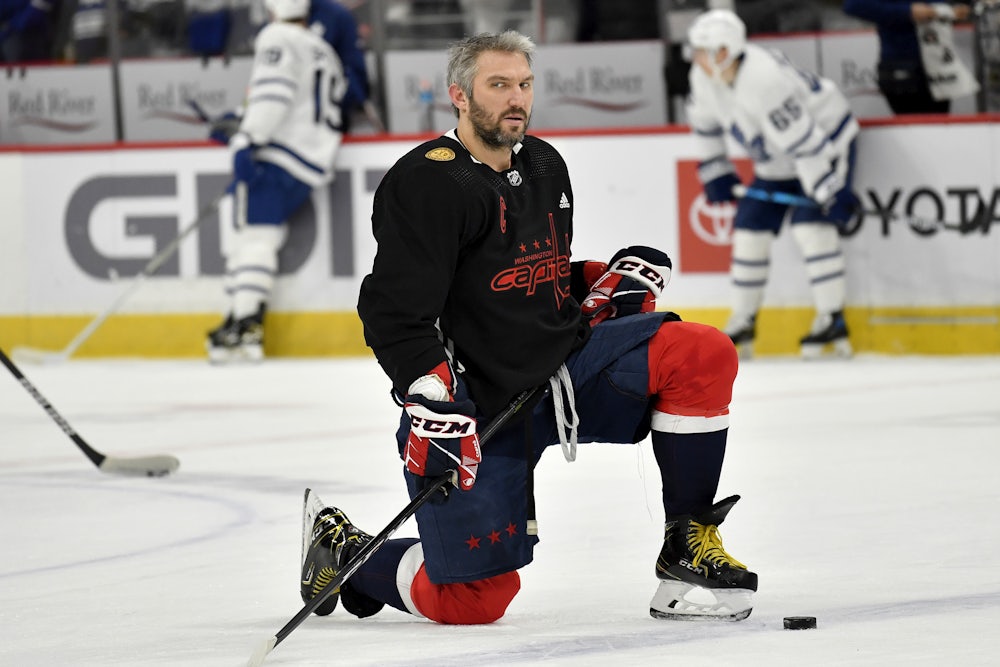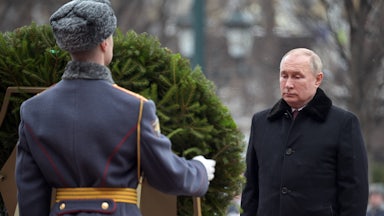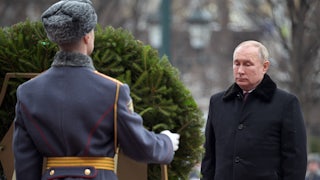Among the deluge of sanctions and boycotts imposed on Russia over the past two weeks, one in particular stood out to me: an announcement by EA Sports that it would remove the Russian national team and Russian clubs from its popular FIFA video game series. “EA Sports stands in solidarity with the Ukrainian people and like so many voices across the world of football, calls for peace and an end to the invasion of Ukraine,” the company said in a statement on Twitter on Wednesday.
FIFA itself announced that it would ban competitions by the Russian and Belorusian national teams over Russia’s invasion of Ukraine. So did the International Olympic Committee and a host of other international sports organizations. While it’s an extraordinary step, banning Russian sports teams from competing is far from unprecedented. Apartheid South Africa, for example, did not compete in the Olympics or international football from the 1960s to the late 1980s because of its refusal to field racially integrated teams. Exiling Russia from these kinds of events is unfortunate for the athletes who want to participate in them, but these banishments deny Putin a vital soft-power platform he’s used to normalize his regime in the past.
But for EA Sports to take a similar step with its video games makes no sense. It does not actually exclude any Russians from participating in anything; the players in the game are entirely digital. It furnishes no diplomatic advantages that could be used, in even some small way, to help end the war. All it does is stigmatize Russia and Russians in general. What’s most worrying is that it seems to be part of a larger cultural backlash in the West toward Russians, one that would be a serious mistake.
These vast cultural boycotts are flawed on two levels. First, they risk legitimizing a more ugly campaign against Russian nationals and immigrants. Thankfully, we haven’t seen anything resembling the attacks on Muslim-Americans in the wake of the September 11 attacks 20 years ago. President Joe Biden and most leaders of the Western alliances have gone to great lengths to isolate Vladimir Putin and his regime as the driving force of the invasion, not the Russian people. And most of the public outpourings of emotion over the war have focused on supporting Ukraine rather than denigrating Russia. There are exceptions, of course: The Russia House, a Russian-themed restaurant in Washington, D.C., was vandalized and defaced earlier this week in an apparent protest of the Ukraine invasion.
Who is being affected? In New York City, the Metropolitan Opera said it would sever ties with Russian artists who refused to condemn Putin. Among those included is opera superstar Anna Nebtrenko, a Russian soprano who publicly condemned the invasion but, in the eyes of the Metropolitan Opera, had not gone far enough. “It is a great artistic loss for the Met and for opera,” Peter Gelb, the company’s general manager, told The New York Times in a statement. “Anna is one of the greatest singers in Met history, but with Putin killing innocent victims in Ukraine there was no way forward.”
Film festivals in Glasgow and Stockholm are excluding films made with support from the Russian government, even if their makers have denounced the invasion. The Munich Philharmonic fired famed composer and conductor Valery Gergiev for refusing to take a stance on the invasion. (He previously expressed some support for the annexation of Crimea in 2014 but offered no open praise for Putin’s actions this time.) Something called the International Cat Federation (or FIFe, for Fédération Internationale Féline) has banned cats belonging to Russian owners from participating in whatever it is that FIFe does, despite the fact that cats do not have nationalities and almost certainly do not understand that Russia has invaded Ukraine.
There have also been public calls for top Russian athletes like the NHL’s Alex Ovechkin to take a more vocal stance against the Russian government. Capitol One Arena, the home of Ovechkin’s Washington Capitals, has had to clarify to fans that flags are permitted to be waved inside the arena after it was erroneously reported that it had banned Ukrainian flags from the facility. The NHL has already suspended its activities in Russia; a few players want to go further and exclude Russian athletes altogether. Some of those Russian athletes are now reportedly receiving death threats.
Perhaps most troublingly, some lawmakers have floated the idea of expelling all Russian students in the United States. “We are not living in normal times,” Arizona Representative Ruben Gallego, a Democrat, claimed last month. “These Russian students are the sons and daughters of the richest Russians. A strong message can be sent by sending them home.” As my colleague Osita Nwanevu recently pointed out, most Russian students in the West are not the children of oligarchs, and punishing them for their parents’ deeds would be immoral even if they were. Any message sent by the U.S. for expelling them would be suffused with cruelty and xenophobia.
Bullying individual Russians into condemning Putin is unlikely to undermine his standing; if anything, it risks giving him proof of the West’s supposed malice toward Russia. These moves also misunderstand how opposition and responsibility work in an authoritarian society. In a democracy, the people share a measure of responsibility for what their government does because they have a degree of ability to change it. That binding thread is far more precarious in an autocratic regime. Russians may have expressed support for Putin in the past out of genuine solidarity with his policies or at least out of partial agreement with them. They may also have felt compelled to do so, either indirectly, to advance their careers and livelihoods, or directly—to avoid more dire consequences.
All authoritarian systems are, by definition, hostile to dissidents. Putin’s regime stands out for its willingness to hunt down and brazenly kill those who oppose him. Russian intelligence agencies are widely believed to be responsible for the assassination of Alexander Litvinenko, a former Russian spy who died of radiation poisoning in 2006 after being dosed with polonium-210 in London, and the poisoning of former agents Sergei and Yulia Skripal with a Novichok nerve agent in Salisbury. It’s worth noting that both attacks took place on British soil, demonstrating Moscow’s willingness to strike at dissidents and political opponents outside its borders.
Political opponents and anti-corruption figures are particularly prone to be targeted. Alexei Navalny, a leading opposition figure, was poisoned with a nerve agent in 2020. He survived and is now serving a prison sentence in Russia. Others haven’t been so fortunate: Anna Politkovskaya, Sergei Magnitsky, Boris Nemtsov, and many more prominent figures have died under suspicious or dubious circumstances over the last two decades. Bad things often happen to critics of the Russian government, even if their deaths can’t be conclusively traced back to the Kremlin.
There are likely prominent Russians living in the West who agree with Putin’s decision to invade Ukraine. And some Russians enjoy greater status and influence with the regime, making them far more legitimate targets for sanctions and boycotts. Western allies have vowed to target the assets of oligarchs to put more pressure on the upper echelons of Russian society. France and Germany seized some of their multimillion-dollar superyachts over the past week; Roman Abramovich is even selling Chelsea Football Club in part to avoid current or imminent sanctions, promising to donate the net proceeds to victims of the Ukraine war.
Those sanctions, from both a moral and financial perspective, are more justified because their targets have some degree of influence on the Russian government and its actions. The same can’t be said for the average Russian citizen, and especially for Russians who live overseas. And while they are also caught up in the severe economic sanctions imposed by the U.S. and its allies on Russia, those sanctions might be justified if they successfully grind the Russian war machine to a halt, or at least give Washington and Brussels some leverage over Moscow to end its aggression.
I don’t want to paint with too broad a brush here. Some moves by cultural and social institutions might be driven just as much by the economic sanctions and the potential legal consequences for violating them. That could explain recent announcements by Disney and Warner Bros., for example, that they would not release upcoming films in Russian theaters. Netflix’s decision to withdraw from Russia was driven by its refusal to carry state-backed propaganda on its service. And the BBC’s suspension of its Russian-language services came after the Duma passed a sweeping new censorship law that threatened to jail journalists who don’t toe the Kremlin line on the war.
Some cultural boycotts, like the Olympic and FIFA ones, can even be valuable diplomatic tools. But that should not extend into a wider cultural campaign against Russians by virtue of their nationality. If Russians freely want to denounce Putin and his war, their courage for doing so should be praised and celebrated. But I’m uncomfortable with demanding that citizens of an authoritarian country must denounce a regime that is more than willing to kill those who criticize it, even if they live overseas. And I worry that treating all Russians like the enemy will do more to shore up Putin’s regime than it will to undermine it.










